If we used our bread to mop up pasta sauce, he yelled, “Don’t lick your plates! Don’t dribble! Don’t slobber!”For my father dibble and slobber also described modern painting, which he couldn’t stand.
He would say, “You have no idea how to behave at the table! I can’t take you lot anywhere.”
Category: Uncategorized
LOLLY WILLOWES by Sylvia Townsend Warner

She knew in her heart that she was no really enjoying this sort of thing, but the habit of useless activity was too strong to be snapped by a change of scene.
She, Laura Willowes, In England, in the year 1922, had entered into a compact with the Devil.
They say: “Dear Lolly! What shall we give her for her birthday this year? Perhaps a hot water bottle. Or what about a nice black scarf? . .. But you say: “Come here, my little bird! I will give you the dangerous black night to stretch your wings in, and poisonous berries to feed on, and a nest made of bones and thorns, perched high up in danger where no one can climb to it.” . . .
. . . One doesn’t become a witch to run around being harmful, or to run around being helpful either, a district visitor on a broomstick. It’s to escape all that – to have a life of one’s own, not an existence doled out to you by others, charitable refuse of their thoughts, so many ounces of stale bread of life a day . ..
Respectable countrywomen keep their grave-clothes in a corner of the chest of drawers, hidden away, and when they want a little comfort they go and look at them, and think that once more, at any rate, they will be worth dressing with care
During the last few years of her life Mrs Willowes grew continually more skilled in evading responsibilities, and her death seemed but the final perfected expression of this skill. It was as if she had said, yawning a delicate cat’s yawn, ‘I think I will go to my grave now,’ and had left the room, her white shawl trailing behind her.
The maid who brought her morning tea. . . had an experienced look; when she drew back the curtains she looked out upon the day with no curiosity. She had seen it all already
Laura . . . had commented upon the beautiful orderliness with which Caroline’s body linen was arranged therein. ‘We have our example,’ said Caroline. ‘The grave-clothes were folded in the tomb. . ..
WAYS OF ESCAPE by Graham Greene
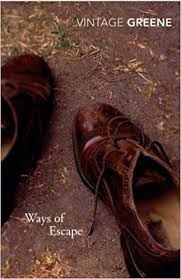
A few months ago I read the first part of Greene’s autobiography, A SORT OF LIFE, that covered his upbringing, first job and first novel. The picture that emerged was of a rather sad young man. WAYS OF ESCAPE is the second installment, and here we find a rather sad middle-aged man.
It’s yet another depressing example of the fact that success apparently doesn’t make you happy. BUT WHY NOT? It seems so unfair. Also a life of glamour and incident doesn’t work, as both of those Green had in spades. He was a successful novelist, and a journalist, and a spy, spending his life in many interesting locations (Vietnam, Sierra Leone, Liberia) among many interesting people. And yet he seems to frame it all as various escapes; he writes books to get away, he goes to dangerous places to get away, but all the while you can’t tell what it is he is trying to get away from.
Mostly I think he is trying to escape that most dogged pursuer, his self. Also, based on his novels, I’d be willing to bet his marriage is pretty unhappy. We don’t find out this juicy stuff though, because as he tells us “I felt that the .. years belonged as much to others as to myself. I couldn’t infringe their copyright. . . They had a right to privacy, and it was impossible to deal with my private life without involving theirs.” How charmingly old-fashioned and thoughtful that seems, especially after just reading THE END. So instead the autobiography is an account of how his novels came to be, which is interesting in itself.
And in learning about the work, you learn something about the man. As a former theatre person myself, I was especially touched to see how he came to love the stage – not as an art form, but as an experience. Let’s end with this rather lovely reflection:
I had imagined that to write a play and to write a film would be very similar: the author, though he could not be excluded from rehearsal, would be an unwelcome stranger lurking ashamed in the studio. . . I had not anticipated the warmth, the amusement, the comradeship of the theatre. Above all I had not realized that the act of creation, as with the novel, would continue for long after the first draft of the play was completed, that it would extend through rehearsals and the opening weeks of the tour. It is for that act of creation that one lives, and after the author has returned from tour, how empty the hours are, the telephone rings seldom – couldn’t we have delayed launching a little longer for the sake of the fun?
Poor guy
THE END by Karl Ove Knausgaard
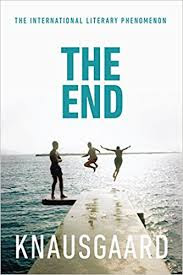
This is the sixth and last book of MY STRUGGLE, Karl Ove Knausgaard’s monumental autobiography. It’s been four thousand pages, and it feels funny to leave him at last.
The series started with his father’s death, and then moved around in time, covering his childhood, adolescence, first marriage, second marriage; and now this one takes us through the early years of his childrens’ lives, the blowback from the publication of the first novels in the series, and the early life of Adolf Hitler.
Yes, for some reason there is a four hundred page sidebar on Hitler. Why? I can’t say I know. Let’s get the sidebar out of the way first. Generally, I think it is creepy to be overly interested in Hitler. It’s also not very illuminating; Karl Ove is a novelist, not a historian or academic (indeed, he did not work very hard at school, as I know, because I spent six hundred pages on the topic), and it shows. So while you don’t learn so much about Hitler, you do learn a lot about Karl Ove, and Scandinavia. It’s funny to see how unimaginable Weimar Germany is to a contemporary Norwegian, and it’s hilarious to see how much emphasis he puts on the character of Hitleer as a driver of the war as opposed to say economic meltdown and hyperinflation, which is obviously by far the bigger issue (I guess a Zimbabwean is always going to think everything is about hyperinflation). That said, I did find some interest in extracts from MEIN KAMPF. I mean, you know that book is always going to be crazy, but try this, even the first few sentences are far more batshit than you would ever imagine:
TODAY it seems to me providential that Fate should have chosen Braunau on the Inn as my birthplace. For this little town lies on the boundary between two German states which we of the younger generation at least have made it our life work to reunite by every means at our disposal.German-Austria must return to the great German mother country, and not because of any economic considerations. No, and again no: even if such a union were unimportant from an economic point of view; yes, even if it were harmful, it must nevertheless take place. One blood demands one Reich.
Okay, Hitler. This Hitler digression is bizarre, but not actually so bizarre as the rest of the book. A discussion of Hitler’s life at least fits into a framework with which we are familiar. What Karl Ove tries to do is something quite out of our experience: actually write about his own life, as honestly as he can. It’s a truly weird thing to do, and in early books I hadn’t quite appreciated how much he was really telling his life. In this book, he describes how people around him responded to the earlier books coming out. His brother, for example, who read in the book how he felt about him for the first time; his high school girlfriend; his wife. In this book he tells us how, after he emails out drafts to them, he lies on his bed and shivers in fear for hours. (Let’s not forget that Karl Ove is not a tough guy: he was terrified as a child of indoor plumbing as I recall.).
Apparently the whole idea came to him on a dreadful package holiday in the Canary Islands, right after he almost got conned into a timeshare. He was inspired by the diaries of someone called Gombrowicz.
. . to go down beneath the surface, beneath the ideologies, which you can only stand up to by insisting on your own experience of reality, and not by denying it, for that is what we do, all the time, deny the reality we have experienced in favour of the reality we have learned, and nowhere was the betrayal of the I, the unique and individual I, greater than in art, as art has always been the privileged domain of the unique. My hands trembled at the very thought, that I could actually describe everything as it was. That all I had to do was just go ahead and do it. What a treacherous thought!‘Just’ my arse!
. . . because I have always had such a weak ego, always felt myself inferior to all others, in every situation. Not only the brilliant individuals I have met, who with their charisma, intelligence and talent have outshone all others, but also taxi drivers, waiters, train conductors, in fact every kind of person one can possibly meet out there. I am inferior to the man who washes down the stairs and the corridors in the building in which we live, he possesses an authority greater than mine in that situation, so for instance, if he says something about the stroller and the balance bikes left outside our door, in a voice that carries even the slightest hint of annoyance, I tremble.
. ..if you want to describe reality as it is, for the individual, and there is no other reality, you have to really go there, you can’t be considerate. And it hurts. It hurts not to be considered and it hurts not to be considerate. This novel has hurt everyone around me, it has hurt me, and in a few years, when they are old enough to read it, it will hurt my children. If I had made it more painful, it would have been truer.
It has been an experiment, and it has failed because I have never even been close to saying what I really mean and describing what I have actually seen, but it is not valueless, at least not completely, for when describing the reality of an individual person, when attempting to be as honest as possible is considered immoral and scandalous, the force of the social dimension is visible and also the way it regulates and controls individuals.
The truth was that when I sat down to write the novel I had nothing to lose. That was why I wrote it. I wasn’t only frustrated, the way you can become when you live as a parent with small children and have many duties and have to sacrifice yourself, I was unhappy, as unhappy as I have ever been, and I was all alone.My life was quite dreadful, that was how I experienced it, I was living a dreadful life, and I wasn’t strong enough, I didn’t have the spine to abandon this and start anew. I often thought about leaving, sometimes several times a day, but I couldn’t do it . . . But that was what made me decide to write a novel in which I threw caution totally to the winds and told it as it was. Only when the book was ready to be published did I realise what I had done and went through the manuscript and crossed out the worst.
CONVERSATIONS WITH FRIENDS by Sally Rooney
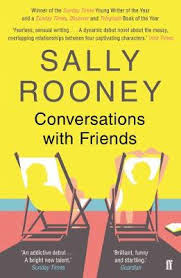
My third re-reading of this book this year! Why! I don’t know! What is it about this book I find so compelling? I really don’t know. It’s like it’s a very small, clean, complicated clock and I’m trying to figure out what makes it go. I can’t think the last time I read a book three times in year. Here’s the first time I read it
THE WINTER SOLDIER by Daniel Mason
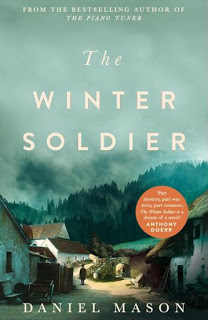
This book tells the story of a doctor assigned to a hospital on the Eastern Front in the First World War. It is in a ruined church in the mountains, and the doors are all bolted not for fear of soldiers, but for fear of wolves. The doctor is in fact just a medical student who skipped a lot of classes and has no practical experience, so he learns on the job from a nun who is a nurse there.
It’s pretty hair-raising, as all novels of the First World War are, and likewise suffers very much by comparison to ALL QUIET ON THE WESTERN FRONT, as all novels of the First World War do, the towering achievement that that book is having basically trumped forever any efforts in this department. That said, I did learn some interesting things from it.
First, one forgets that the Hapsburg Empire was an Empire, and a big one; I guess I was born on the side of the winners of that war, and so have not been brought up to know much about the losers. Second, I learnt that lice was a really serious issue; people did not take their clothes off for months and the itching was maddening. I went down something of an internet blackhole on this one, and – fun fact: the expression ‘having a chat’ comes from the lice problem in this war. Soldiers called them ‘chats’ and used to spend huge time sitting around talking to each other while they burnt them out of the seams of their clothes. Third, I learnt some more about shell shock. Affected people literally could not stand up, their legs getting all wiggly and rubbery, or suddenly went blind and/or deaf (not biologically, but genuinely). You can find videos of it online, and it’s more shocking than you would think. I can’t even imagine what you could see that would be so bad you would be unable to walk afterwards. I sincerely hope that I never find out. Lastly, I learnt more than I wanted to about the terrible practice of Anbinden. This is where someone accused of cowardice would be tied to a tree for a few hours. Doesn’t sound so bad, except it’s -20C.
In the end, SPOILER ALERT the doctor ends up sleeping with the nun, and then is separated from her by the fortunes of war, and then searches for her for two years and finds her but she has moved on – to an ex-shell shock patient of his about whom he felt guilty. I think it is supposed to feel redemptive.
I enjoyed this book overall, despite the ending. It had a strong narrative, and an interesting and well-researched world. Funny to say though, I know I will forget it almost immediately. I think this is because it has a kind of emptiness to it. I’ve found this before, where a book that ticks all the boxes – narrative, tone, character – and yet you don’t care. My theory is that this is because a book needs to be about something else than narrative and character; it needs to have an idea behind it, of some kind – an emotional centre or theme that sits outside the story. Like LESS is about making peace with yourself; and CALL ME BY YOUR NAME is about regret; I couldn’t say what this one is about. But at least I know now all about lice and Anbinden.
CIVIL CONTRACT by Georgette Heyer
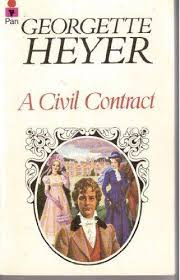
Yes, the Heyer kick is still ongoing. And this is still the books bought in a dusty second hand store on a rain day.
Heyer here tries to veer from her standard plot outline, with unhappy results. This one is a story about a couple who marry for convenience (one for money, one for a title), and end up in love anyway. Sounds unlikely as a plot, and indeed it doesn’t really work. However, who cares: it has narrative drive and fun, which is what you really want anyway.
WAR WITH THE NEWTS by Karel Capek
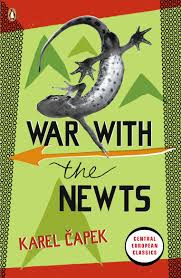
It’s always a gamble to try a 1930s sci fi. Especially when it is in addition a satire on global politics. And especially when the author is mostly famous for a another book (Actually a play, RUR, which gave us the word robot). The heavy emphasis on lizards is also not a good sign.
This was a gamble that paid off. WAR WITH THE NEWTS is a very strange, very contemporary book, that is made up of bits and pieces of news reports, scientific studies, and ordinary narrative. It begins with the discovery of some large undersea lizards, whose population is kept small by shark attacks. A crusty old sea captain discovers they are teachable, and once they have knives, the shark problem is very much handled and their population explodes. Humans find lots of uses for the newts, especially in construction and manufacturing.
Being humans, we also of course conduct terrible experiments on them, or try to educate them, or get them to cover their genitals. Slowly it becomes clear to everyone that the newts are building up armaments under water, but the countries can’t agree to do anything about it, as they are all solving for short term self-interest rather than long term human survival. It doesn’t end well.
I find it interesting that Capek wrote it as a satire in the lead up to the Second World War, because it is depressingly relevant to the following current problems: imperialism, Trump, climate change. Especially climate change. I guess we don’t change so much.
THE KINGDOM by Emmanuel Carrere

On the back of this book, one of its critics describes it as: “Lives of the Saints retold by Karl Ove Knausgaard.” My initial thought was: what?
Pliny discovers that the civic religion is in decline, the temples are empty, no one at the marketplace wants to buy meat that’s been sacrificed to the gods, and from what he’s gathered, the principal reason for this . . . is the success of a sect he’s never heard of before: the disciples of Christus. They get to together in secret. Pliny’s chief of staff thinks it’s to have group sex. . . . (Pliny) makes inquiries, sends someone, and the results of his investigations are disconcerting. When they get together, these people limit themselves to sharing a frugal meal, smiling, and singing hymns. So much mildness is worrying. Pliny would have preferred debauchery, but he has to face the facts: no one’s sleeping with anyone.
It’s amazing, really. The power of ideas to change the world is something really remarkable.
I also learnt a lot about other philosophies in competition with Christianity at that time. Enjoy this as a last snippet, which should make you think twice about our own capitalist world:
Whether Epicureans or Stoics, all the wise men taught that fortune is changing, unpredictable, and that we must be ready to lose all we have without a murmur. None of them, however, would have recommended or even entertained the idea of getting rid of it on purpose. They all considered what they called otium – that is, leisure and the free use of one’s time – to be an absolute condition of human accomplishment. Seneca, one of Paul’s most famous contemporaries, says something quite nice on that topic: if by some mischance he were reduced to working for a living, no big deal; he’d just kill himself.
After reading this book, I realised I’ve read another book by this same author: THE ADVERSARY. Memoir? History? No, it’s a straightforward piece of true crime. This author is truly kooky. It gives me hope for the world of publishing.
SYLVESTER by Georgette Heyer

Yes I read another one. I should have been reading ‘modern classic’ THE KINGDOM by Emmanuel Carrere, but honestly, what can you do? Sometimes you just want to read trashy fun.
